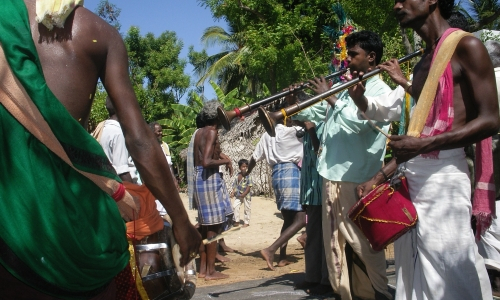
After the Tsunami of December 2004, Mrs. (Prof. Dr.) Shyama V. Ramani, an Indian economist based in France, adopted an isolated coastal village called Kameswaram in Tamil Nadu, India near the town of Nagapattinam. The objective of her project was to help the village attain fundamental developmental goals like income security, basic sanitation and health standards, gender equality and security for children through the introduction of innovations (new to Kameswaram) in the form of new structures, new technology, new management routines and new social norms.
During the first four years (2005-2009), she raised funds for other Indian NGOs to implement development projects in Kameswaram and documented the progress. The charity Friend-in-Need Trust was registered in Tiruchirapalli, Tamil Nadu, in June 2006 for this purpose. Later on, the trust deed was amended to reflect its location in Kameswaram village in Nagapattinam district of Tamil Nadu – under the name Friend In Need India Trust.
In 2009, it was noticed that many of infrastructure installations were not being efficiently used or not being used at all, because of a variety of reasons ranging from: (A) a lack of awareness, a lack of skills, a lack of motivation – on the part of the villagers; (B) faulty construction on the part of the project implementers; and (C) a lack of a local agency in the village which could maintain and repair the installations. In fact, there are no organizations that maintain and repair installations put in by charities and/or development agencies in most villages. Thus, from 2009 to 2012, Shyama and her sole staff member Mr.Paranjothi repaired whatever they could. Thereafter, it has undergone several transformations engendered by its learning as well as its societal impact.
FIN started with a two-fold mission. First, to rehabilitate an isolated coastal village in India named Kameswaram and make it as clean as any in the world, focussing on sanitation and waste management. Second, to generate knowledge for scientific and practitioner communities on this transformation process, using the village as a living lab. Over the years, FIN developed a third mission, namely to teach and train diverse stakeholder groups (communities, school children, college students, policy makers) on issues related to sanitation, waste management and hygiene behaviour, and undertake action-research. For this purpose, in 2018, an online teaching and research community was created and housed under: The Centre for Circular Economy.
Thus today FIN is a teaching and research lab, with two divisions: The living rural lab in Kameswaram village creating frugal pro-poor eco innovations and testing them locally and the Centre for Circular Economy. Both divisions also undertake research, offer internships and teaching modules and organize events – for other societal stakeholders such as public agencies, NGOs, firms, CSR foundations and civil society. The focus is always on the WASH variables: Waste management, water, sanitation, hygiene, hygiene behaviour and their transformation into economic and social value.

